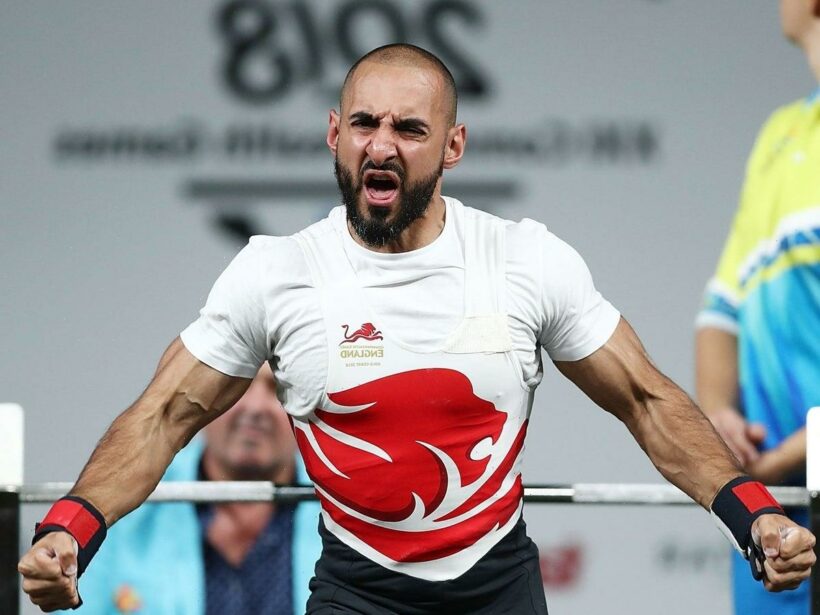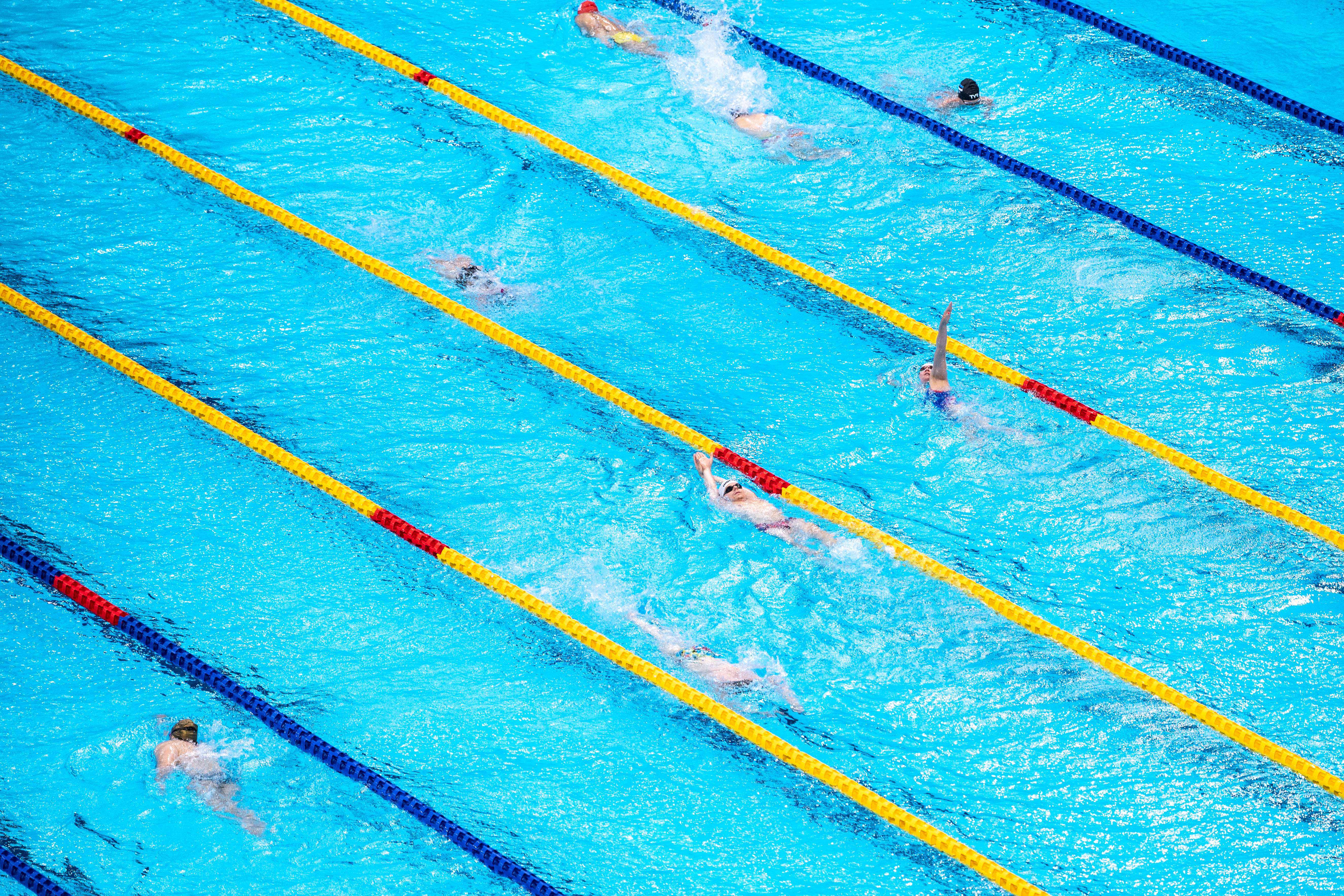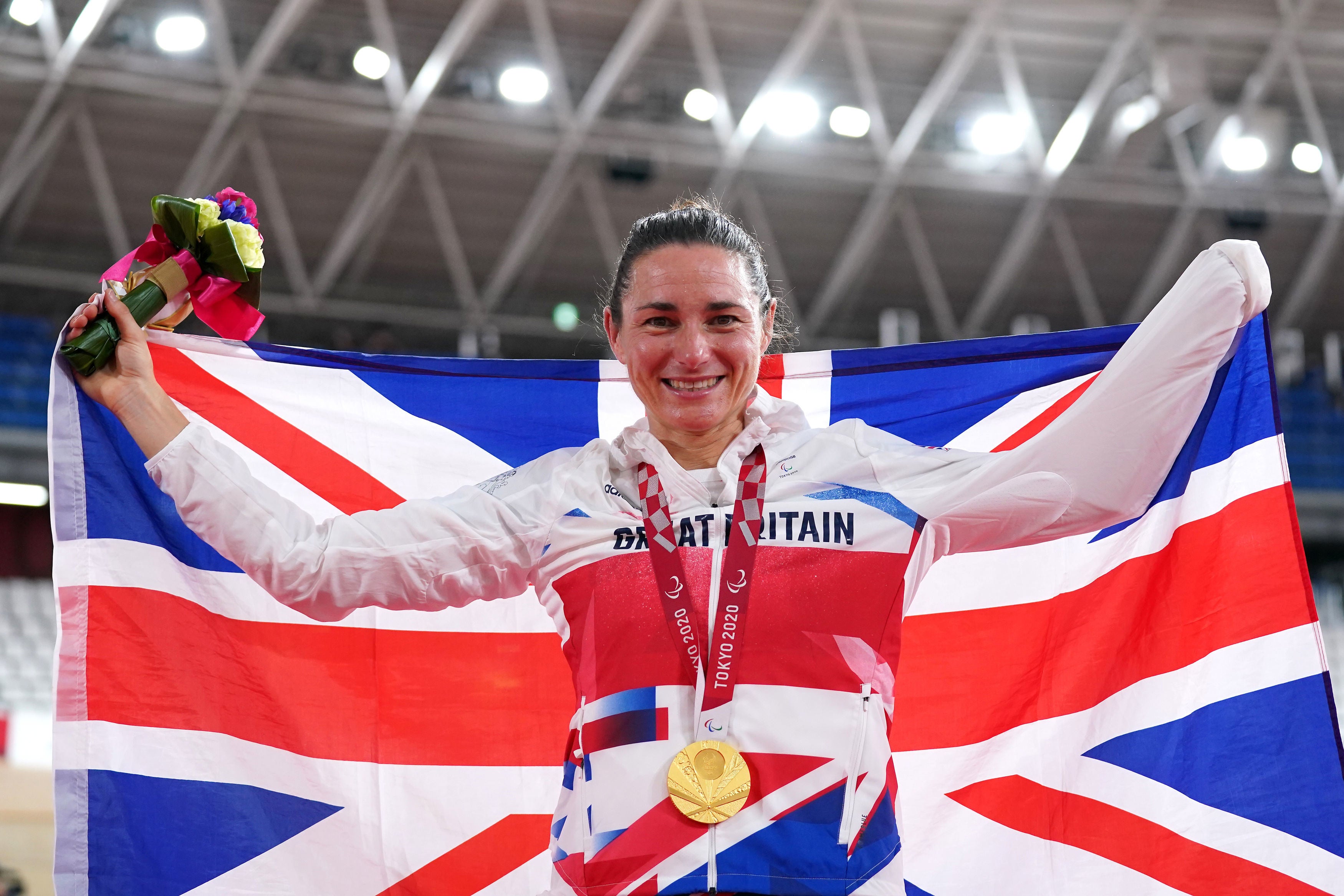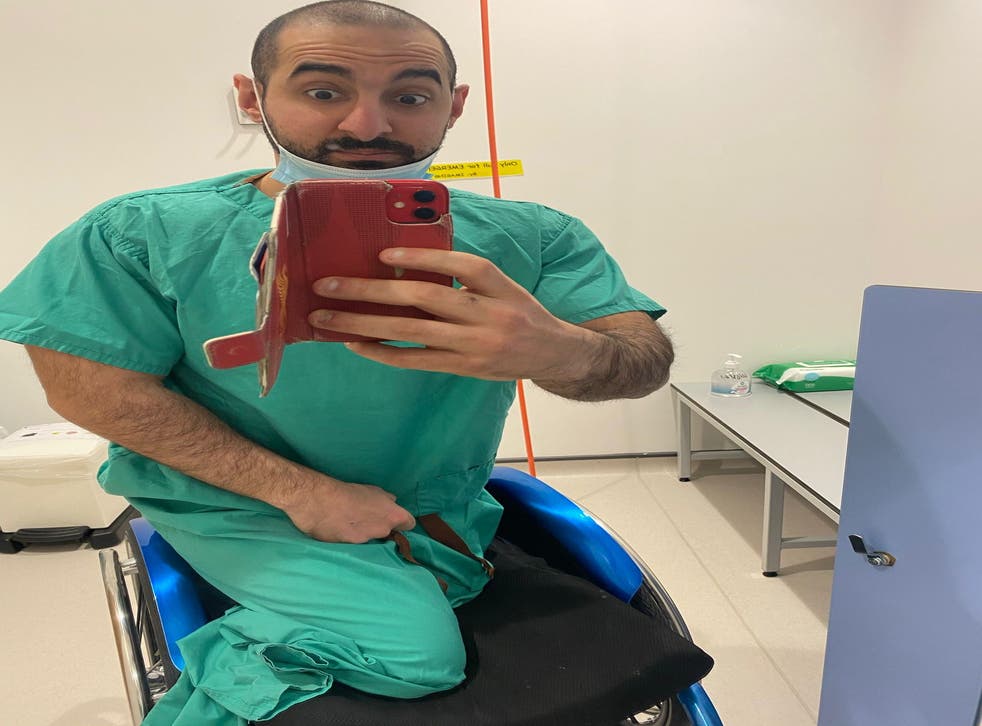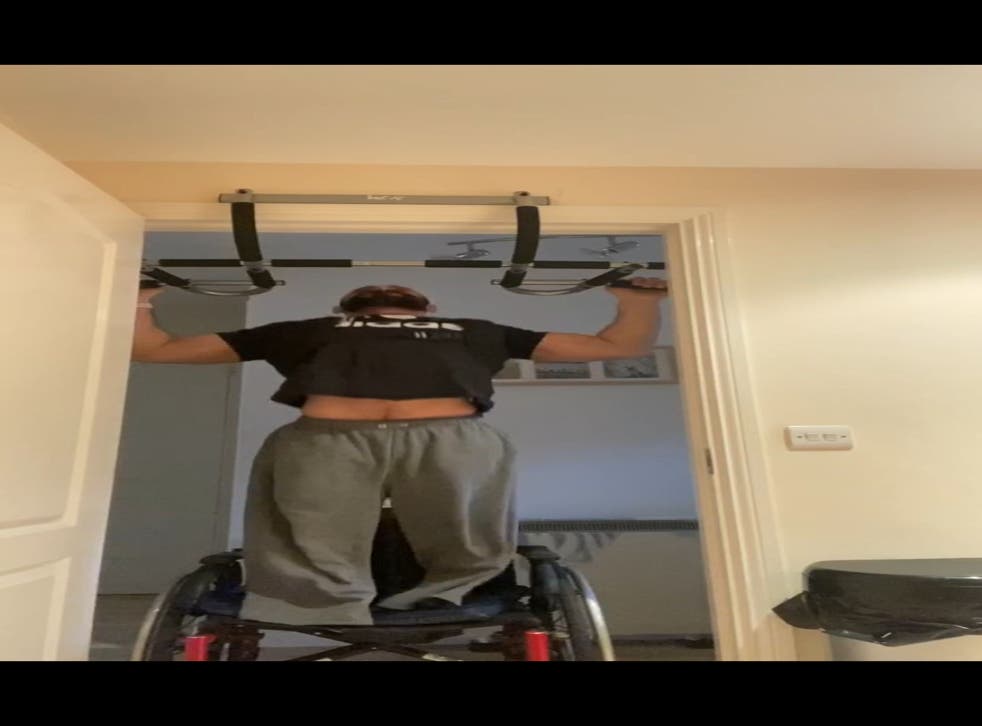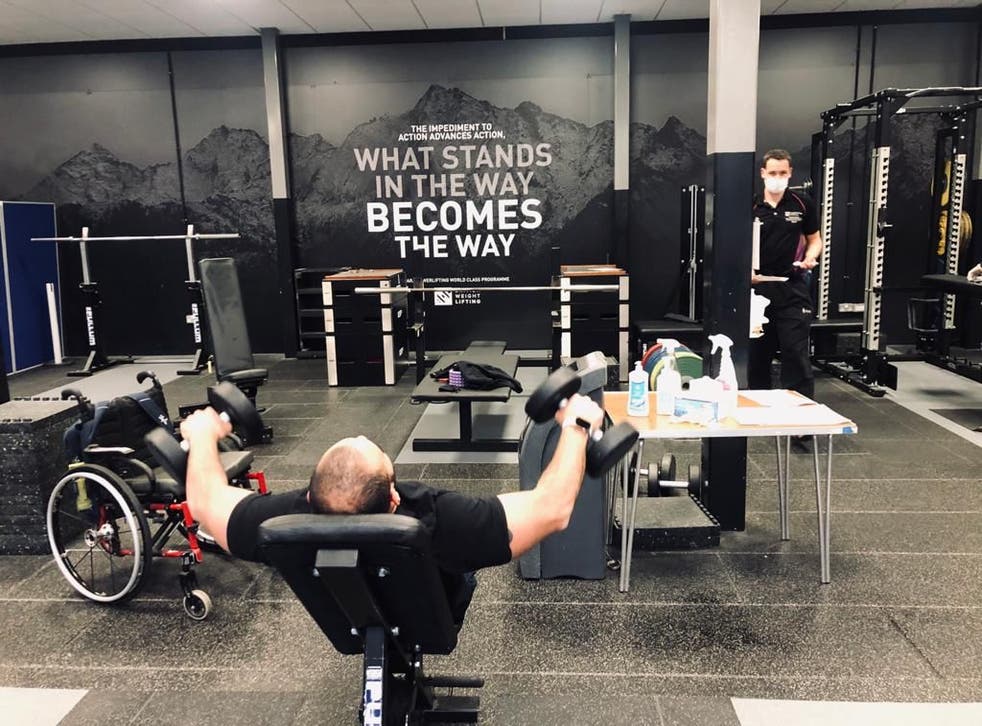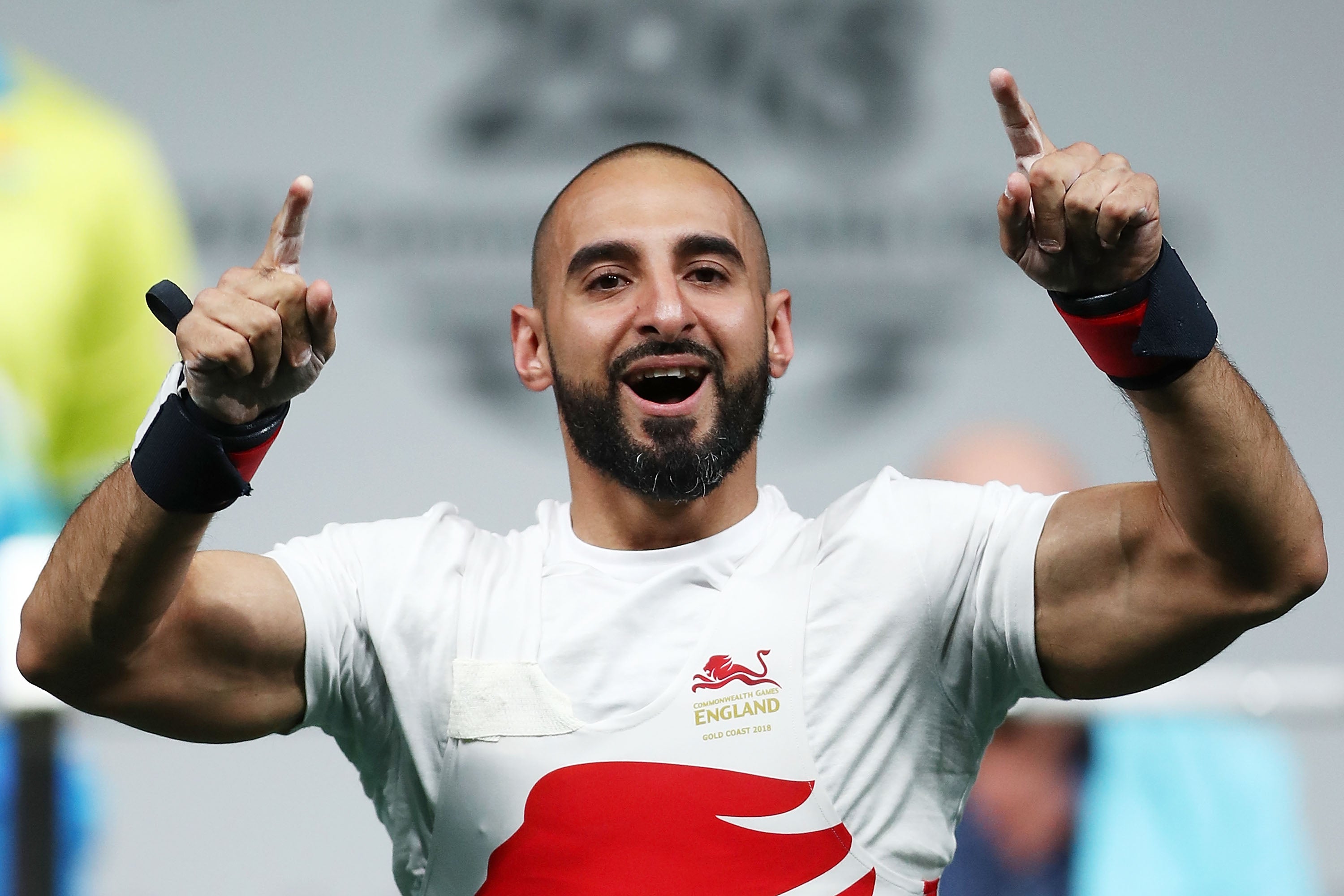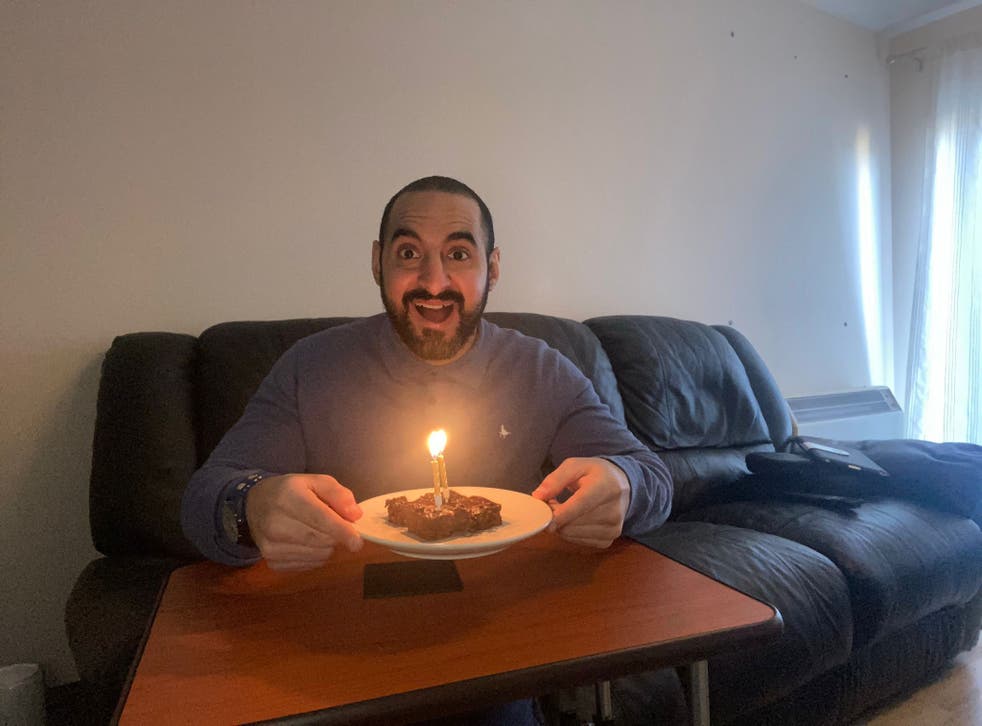Ali Jawad of England celebrates a lift in the Men’s Lightweight Final during the Para Powerlifting on day six of the Gold Coast 2018 Commonwealth Games
There is something Ali Jawad wants The Independent to know straight away.
The Ali Jawad who won silver at the 2016 Paralympics is no more. So too the one who took gold in the European Championships the year before, and the one crowned World Champion the year before that. As for that 24-year-old who lifted 185.5kg in November 2013 – a world record at the time – he’s long gone, too.
“I can’t guarantee anything,” he offers earnestly in the first of a series of monthly chats with The Independent over Zoom. The United Kingdom is currently in its first lockdown in 2020 and, with the Tokyo Games postponed for a year, Jawad has agreed to document his journey through to the summer of 2021. But before we begin, he wants to make it clear that this could all be a waste of time.
He has lost muscle mass and some of the bravado that made him one of the most revered Paralympian powerlifters. In turn, his ranking has taken a sizeable hit. At the start of 2020, he sat outside the top eight qualification spots and was unlikely to rectify that to qualify for the Paralympics that summer.
The debilitating effects of his Crohn’s disease grow greater each day. He was diagnosed with inflammatory bowel disease in 2009, at the age of 22, and had been managing to keep it in check. Since 2016 however, his condition has deteriorated so much that he has not lifted within 20kg of the 190 that secured him silver in Rio. Though he was born without legs, he maintains Crohn’s is more debilitating.
Recommended
Crohn’s also puts him in the high-risk category for Covid-19, meaning he must shield at home. With the gyms shut and human interaction carrying a threat of infection, the bulk of his training must be done in solitude, without the stimulus of a coach or camaraderie.
“People don’t listen, and it drives me nuts,” he warns. The frustration of previous media engagements where he has tried to press home just how far he has fallen is palpable. For some reason, people don’t seem to believe him. Even his fellow lifters think he’s playing possum.
“This has been the biggest de-transformation you’ve ever seen,” he says. “The old Ali is gone.”
Just to ensure the message comes across that the journey will be rocky, perhaps even joyless, he goes one step further.
“The old Ali – he’s dead. And he’s not coming back.”
Ali Jawad has overcome incredible hardship to make it to Tokyo
THE TWIST OF FATE
Jawad lives in a two-bedroom house in Loughborough, a five-minute drive from the British national performance affixed to the University. As one of over 1,000 athletes funded by the National Lottery on the UK Sports World Class Programme, he trains full-time and has the best coaches and medical support in the world at his beck and call. But on 24 March, 2020, their calls, along with those of family and friends, are being ignored.
Official confirmation had come through that Olympics and Paralympics will be delayed by a year. Jawad was touch and go for making it to 2020’s Games, but there were events lined up to break into the top eight. After Beijing 2008, London 2012 and Rio, Tokyo2020 was to be his fourth and final appearance at this level.
In October, he was scheduled to take part in a stem cell trial that featured aggressive chemotherapy as a final solution to his Crohn’s. Having put it off once before, he could not do so again, and because of the severe nature of the treatment, he would have to retire. As such, the year postponement was as good as a cancellation for Jawad.
He closed the curtains and spent 24 hours alone in darkness that was regularly broken by the illumination of his phone. “OMG what’s going to happen?” Read one message. “Can you get through the trial and make it to next summer?” Read another.
Each well-meaning and greeted with a grimace. His health was deteriorating, the medication slowly stripping him of his physical gifts. The trial was a must, and a nine-month turnaround from chemotherapy to top-level sport impossible. Of course this was it. He turned his phone down, face first, and got back to his own thoughts.
“You’re not going” reverberated around his head. The sacrifice since 2016 was now for nothing. With each repeat of that phrase, he thumbed a little further back through his story, through the Paralympics, Worlds, Euros and Commonwealth Games. Amid the pages of his memory, he found peace.
“To think, you’ve overcome so much and then it takes a world pandemic to stop you,” he said to himself.
Ali Jawad speaks to his team over Zoom
He had given everything for 2020, and never any less before. The battle with Crohn’s was never going to be one he’d win on his own, but he had pushed it right to the final round. It was only Covid-19 throwing in the towel that brought the bout to an end.
Within Jawad’s possessions are medals of every colour from all the major competitions. He’d been world number one, he’d broken world records. He became only the second person with Crohn’s to medal at a Games in 2016, two weeks after American swimmer Kathleen Baker won gold and silver at the Olympics. Pound-for-pound,b there was an argument to be made and won that there has never been a better disabled or able-bodied British Weightlifter than the man who was born in Lebanon without legs, who grew up in a deprived area of Tottenham and found lifting into his teens on a whim. Legacies have been built and sustained on a lot less.
As he went to bed and awoke up on 25 March, he was unaware of light that was about to break through. That morning, Jawad was informed coronavirus had also pushed back the stem cell trial. With that came a hurricane of a second wind.
Acceptance of his fate morphed immediately into a desire to grasp an opportunity to reshape it, one last, final time. He had been gifted 16 more months, enough time to confirm qualification by achieving the necessary top eight ranking, bridge the gap that had his rivals had established over him since Rio. Perhaps even pip one of them to a medal.
What he thought the pandemic had taken away from him had been handed back with interest.
Ali Jawad converted his home into a gym throughout lockdown
THE ROUTINE
Due to the severity of his Crohn’s, Jawad has been isolating before it became law. Lockdown living was nothing new.
He preferred things this way, to a point. Losing access to the gym was a blow, but beyond that, his unwavering focus on his goals meant aspects of downtime, like socialising, were regarded as unnecessary distractions. An outlook underpinned by an incredible attention to detail and relentless desire to control as much of his surroundings as possible. Confinement and maintaining a repetitive routine indefinitely was no tax on his quest for, as he puts it, “one last legless dance”.
Every day the alarm would go off at 5am, giving him at least an hour for breakfast while he read a journal relating to his thesis: Intentional Misrepresentation in Parasport. The thesis will look at the prevalence of athletes over-exaggerating the assessments within classifications to gain a favourable advantage by being placed in a category they are not supposed to be in. “Anti-doping has been a hobby of mine,” says Jawad. “If you can call it that.”
During his career, he has identified gaps in policies that have been exploited and is keen to gauge where “wilful misclassification” ranks alongside substance doping and boosting.
“I see and hear things policy-makers don’t,” he says on an issue he believes as the biggest threat to the integrity of the Paralympic Games. His thesis will run to 80,000 words, with the Literature Review clocking in at 17,500. When published, it will be the first study of its kind.
Training begins at 9:30am to midday. Unable to use the state of the art facilities on his doorstep, he has been furnished with all the necessary equipment by British Weightlifting. The amount of free weights, dumbbells, bars and benches makes his set-up more “gym-home” than “home gym”.
With no one on hand to assist him, getting adequate progressive work for supplementary exercises required is an issue. It is far from an ideal situation given the few events that remain on the calendar to pick his ranking up. The first of those is a World Cup event in Manchester scheduled for March 2021. He does however have the necessary weights on his bench press. Including a crucial piece of technology.
Because Crohn’s has made Jawad more susceptible to muscle tears, he and his team have had to train smart in order to bank as many consecutive training sessions as possible. To give themselves the best chance to do that, they have ditched weight for speed.
For the last two years, Jawad’s progress has been measured on speed of the bar rather than the weights on it. With the help of GymAware technology, sensors are stuck on the bar and feed directly to an iPad which gives instant feedback on how quickly it is being lifted.
The key figure for Jawad is 0.24 meters per second. Through careful trial and error, this is the point where he is capable of two more lifts at that particular weight. It is also the point where he must stop. “In the past if we dropped that threshold below 0.24, the likelihood of injury was higher,” he states.
Sometimes the speed is great, in which case the bar is loaded further, and vice-versa. There are also necessary adjustments of ego, too.
“Before, I’d just fight through everything. That’s what you do as an athlete, right? Now, in my situation, it’s about making sure I can fight another day.”
After training comes lunch, before an afternoon of PhD writing and working on his side-project, AccesserCise Fitness – a disability fitness app. As well as containing workouts, the app will allow fitness venues to be rated by their accessibility with users determining the rankings. Jawad hopes a byproduct will be more pressure on governments to adjust their legislations to benefit the disabled community.
By 7pm, the books and laptops are shut and the boxsets cracked open. Prison Break was dusted off with ease, as was Money Heist, which he says is “mind-blowingly good”. Line of Duty also plugged the gap before he started taking recommendations.
Liverpool FC has also proven a welcome distraction throughout his life, although not quite as much across 2020 and 2021. Then comes a book at bedtime before he rests his head to do it all again tomorrow.
THE NIGHTMARES
Prednisone is a corticosteroid commonly used to treat Crohn’s. Taken orally, a dosage of 10 to 40 milligrams per day is generally prescribed to adult sufferers for a period ranging between two to 15 weeks, depending on a variety of issues such as the severity of the conditions. Jawad has been taking 20 miligrams per day for the last three years.
With National Lottery funding ensuring access to top medical professionals, his bloodwork has been consistently monitored for irregularities. The plan was originally for two years at this dosage, After competing on 27 August, he will be carefully tapered down with a view to finding an alternative medicine with the help of consultants who will be able to identify treatments his antibodies won’t reject.
“I’ve pushed it to the absolute brink,” he says, wearily. “The goal was to get me to Tokyo. After that comes putting my health first.” The stem cell trial he was booked in for last year is no longer on the table. His options are limited.
The side-effects of prednisone directly correlate to the issues Jawad has had with his body since beginning this course in 2019. The weakening of his muscles is why he has experienced numerous pectoral tears over since 2016, along with external and internal bruises that take longer to heal. Worst of all is that he has no feel of when these injuries will come. Every lift is a game of Russian roulette. Losing can cost him up to 12 weeks – a greater threat to his swansong with each day the Games draws near.
Disaster struck two weeks out from the Manchester World Cup event when he suffered a slight tear in his shoulder. He kept the injury quiet and went anyway, lifting 161kg, some 10 kilos light of what he had hoped. The lift moved him into the top eight before it was beaten in the same event to dump him back out of the Paralympic qualification spots.
Ali Jawad during training throughout the pandemic
His joints are temperamental, menial tasks sapping him of energy at the worst of times. The ability to shed fat to remain within weight categories is that little bit harder. When the rest of the country were baking banana bread, he was fine-tuning his recipe for protein energy balls.
There have been mini-successes. He is not prone to the mood swings, and his hard-nosed mindset has helped quash the doubts that filter through during his darker moments. There is also one largely unreported side-effect he was learned to cope with. The nightmares. Very dark nightmares.
“Murders,” starts Jawad. “People killing in the most disgusting way. Like, what’s the scariest film you’ve ever seen? Hostel? Saw? Like them. They’re really violent.”
He often wakes up in a cold sweat, and there have been many sleepless nights over the last two years. The thing is, though, they do not scar Jawad. He loves horror films.
He is a huge fan of the Insidious franchise. “All the religious and asylum films, too” he adds. Psychological thrillers rooted in historical and fictional text also get him.
“I grew up with the Halloween films. Remember Candyman? I still can’t bring myself to say that in a mirror now!
“Thinking back, I don’t know why my dad even let me watch them. I think he thought it was character building: that if I could deal with these, I could deal with anything. Even being disabled!”
It speaks of his love of the genre that this discussion – in December, 2020 – is the first time he addresses plans after powerlifting. And of course for Jawad, it is an ambitious project to right a perceived wrong.
“You know, I’ve not been impressed with too many horror films lately. So I think when I retire, I’m going to write the scariest horror film of all time.
“In fact, you know what, Hollywood are missing a trick not casting me as a bad guy. I can gallop without legs, I’ve got muscles. I’ll be the scariest dog zombie ever!”
BAD SON, BAD BOYFRIEND
“My mum’s not happy,” says Jawad with a rueful grin. He has just told her he will not be coming home for Christmas.
Hailing from Lebanon before moving to England when he was six months old, Christmas has never been a thing in the Jawad household. Ali was 19 when he first experienced the festive period properly. Nevertheless, time off meant it was always an excuse to reconvene at the family home in Tottenham, North London, with the rest of a big family.
This time, however, Ali was staying in Loughborough. The need to train every day meant time off and in a Tier 3 lockdown without access to a gym, and away from his home set-up was not an option. Though he could have used them as his support bubble, even for only a few days, the issue of mixing with six other people was not worth the risk. His mum did his best to convince him, as he stated the strong arguments against a homecoming in the mix of Arabic and English he uses when speaking to close relatives.
Ali was raised as a strict Muslim, though the challenges of elite-level competition mean partaking in Ramadan – and subsequently, Eid – is challenging. Crohn’s has added an extra barrier with daily medication meaning he is unable to adhere to the 30-day fast.
Ali Jawad has sacrificed a great deal in the build-up to Tokyo 2020
Nevertheless, he cites the belief structure within Islam and does as much as he can to give back to the broader community. “You look around in the sporting world and you realise there aren’t many Muslims at the top level.”
He trained on Christmas Day, cooking his own turkey for the first time, then New Years Day. He promises to make-up for those with some indulgences in 2022, Crohn’s medication permitting. Even as heavily westernised immigrant, his experiences of these celebrations rely on friends. Friends that, right now, he does not have time for.
It is while discussing the last normal Christmas of 2019 that Jawad begins to contemplate his relationships. He spent one with the family of the girl he was seeing, at a “very nice house” just outside of Loughborough. They weren’t official, per se, but enough that the holidays were spent together. Like the rest of the world, it went downhill at the start of 2020.
Like him, she was an athlete. He prefers it that way: a similar drive and an acceptance that neither can come first. There are downsides, of course – “you don’t want to be in the same room as them after a bad training session or competition”. Generally, there is a mutual, well, getting it. “They go through it too,” says Jawad. “They know how focused on yourself you need to be.”
Jawad’s parents were worried about marriage – arranged or otherwise – a key factor of life and status in their background. “In the Arabic, Muslim community, marrying someone disabled is not something many girls aspire to, is it?”
He has never regarded his disability as something to overcome. In fact, he uses it as a gambit. “I think it’s made me self-confident – I can basically say anything about people just go along with it. So I suppose I go up to girls and I’m quite flirty. And maybe girls are shocked by that. ‘He’s rough but he’s confident and funny, I’ll give him that. No model but a good body considering!’”
The struggle, though, is what he is willing to offer, which he admits is very little. He’s been told he has the wares to be a good boyfriend: engaging, considerate, intelligent, with a good sense of humour. But he is selfish, because that’s a requirement of the job.
“I’m as honest as possible: with the way I live my life, all the commitments, they are never going to be in the top six things in my list. And, really, who wants that? Relationships are about compromises. I can’t compromise.”
There is a first love that set the standard few can meet. Who matched him for intensity, discipline, challenged him when he needed it and the rest of the frills that make love great. But the circumstances have changed in all facets of Jawad’s life.
“They like the red carpet events, and maybe the profile of who they are dating. But behind closed doors, there are considerations they don’t think of. Never mind not being first – or second – but if I have a flare up with Crohn’s, they are going to see that. Oh and I’ll always pick training over them.
“If I was a girl, would I date me? No! Also, I’m a terrible date – I can’t eat or drink anything when we go out.”
On 12 January, 2021, Jawad spends his 32nd birthday alone with another workout session in the bank and another call from his family that ends with a failed attempt to convince him to come home and celebrate with a flying visit. His mum complains he is getting worse at keeping in touch.
“See,” he says. “I’m a bad son and a bad boyfriend. Don’t come near me!”
Ali Jawad of England celebrates a lift in the Men’s Lightweight Final at the Gold Coast 2018 Commonwealth Games
THE LAST SHOT
On March 29, 2020, the Monday after the disappointment of the Manchester World Cup event, Jawad is back in training. The shoulder tear that impinged his performance is thankfully not severe enough to stop him.
That is partly down to two important interventions. The first came as Jawad felt slight discomfort as he prepared for a training lift. In the past he might have cracked on and done more damage. But with senses more aware, he parked the “Warrior ego” and rested the bar back to its starting point.
The second was a return to his 59kg weight having originally begun this journey angling for a spot at the Games in the 54kg category. This eureka moment came in February when he decided with his coaches that the extra kilos will improve his physical robustness and, thus, recovery.
However, moving up a class meant moving further away from medal contention. At 54, he ascertained he was perhaps 7kg off a medal spot. At 59, though, his rough calculations put bronze at 180-plus. He hasn’t benched anything more than 170kg in the last five years.
“I can take more training stimulus,” he says of the extra bulk. “It’s a healthier place to be. But I’ve kind of accepted the medal has gone at 59kg. I’m asking myself to put on 10/15kg in five months. That’s unrealistic given recent history.
“Then again, my best ever is 20kg above that, so you never know. My body might go, ‘oh, I remember this – I’ll give you something after years of taking it away’.”
It was at this weight that he won his Paralympic silver and World Championship gold. And most instructive, this is the first time in these chats he has positively referenced the “old” Ali Jawad. Turns out he was still in there all along.
The next decision to make was which of the next World Cup legs to attend in order to qualify at this new weight. The two options were Tbilisi in May or Dubai in June.
The longer lead-up to Dubai meant more training time to put together enough sessions, and mitigate for the odd drawback. Jawad could realistically get to the state he was prior to his shoulder injury where 175kg was within reach. The major drawback was the quarantine ruling brought in by the UK government of a mandatory 10-day quarantine for anyone returning from the United Arab Emirates, even with elite athlete dispensation.
https://www.instagram.com/p/CS6GPX8LXJu
Though Tblisi had a shorter preparation time, returning from Bulgaria would not require Jawad to quarantine. Given the strides he had been making upon safely returning to the gym environment in the new year, any period of inactivity would be problematic. Tblisi was marked in the calendar as the last chance.
As the Paralympics began to come into view, so did the media requests. Interviews came and went, many with an air of finality. “I did one the other day that felt like they were preparing an obituary,” Jawad says. Much of his talk throughout this process with The Independent has carried a tinge of “this is it”. Remember, all that stuff about “the old Ali”
“You reckon?!” Comes the counter, before transcripts are read back to him. But his game face is on, replete with the noise-cancelling earmuffs. “Save that chat for the end.”
The doubts reveal themselves when he is summoned for marketing duties. Channel 4 want to use him in their adverts. ParalympicsGB insist on using him in their kit launch.
“I’ve been transparent with them,” he reiterates. “I said I might not even make it, I shouldn’t be in any adverts of associated with it yet. I’m going to embarrass myself if my face is there and I’m watching it sat at home.”
The broadcaster and the team maintain his presence as someone who embodies the Paralympic values. He smiles for the cameras and dons the team colours, and as he takes in the rough cuts of both, he switches. He shares a photo of himself in kit with the caveat that, at the time of tweeting, he is wearing it as a fan.
He keeps it on for a while, long enough to take it in, though nowhere near as long as the two hours in front of the mirror when he first got his hands on GB stash ahead of the 2008 Games. His parents and his coaches scolded him for wearing it so often before he had even got to Beijing.
Ali Jawad spent much of 2020 in isolation due to being in the high-risk category for Covid-19
“This time,” he states, “It’ll be the most I’ll have worked to earn it.”
After clearing it with GB medical officials, Jawad is allowed to stay at his family home before the flight out of London Heathrow to Bulgaria. It means he will see his parents for the first time in 10 months.
The build-up to Tblisi was as flawless as it could have been, as reflected in his three lifts. He starts at 165, moves to 167 and, with his final attempt, nails three white lights – only two were needed – at 170.
The last lift is the most spectacular for the celebration: a front flip off the bench that was the hallmark of the old Ali Jawad. He screams the kind of scream you can only scream when you’ve endured what he has, pounding the floor to complete what feels very much like the exorcisms he enjoys watching on the silver screen. There are more screams after he gets back into his chair and is wheeled away to the back.
He is going to Tokyo. He is going to be a Paralympian for a fourth time. The Channel 4 adverts featuring footage of Jawad on his living room bench press are released. The kit launch photos are glossed and published far and wide. The posters bearing his face are being primed. A champion story is to have its champion ending.
At 10:20pm on 23 July 2021, just over a month away from the opening ceremony of the Paralympics, and day one of the Olympics, Jawad sends an email to The Independent:
TO TOKYO…
Jawad’s high upon returning from Tblisi did not last long.
After years of negotiation of mind asking the body for the slightest cooperation, it dragged it reluctantly to: “To qualify, I had to take myself to a place where I hadn’t taken myself to.” As such, the long journey back was not just unfamiliar, but unpredictable.
There were complications with his joints. Transferring in and out of his chair drained him of energy, as did other everyday tasks. Training, of course, suffered. The necessary incremental overloads required to build to a medal were not being done regularly enough to have an effect. Each morning he would awake and try and sift through his ailments to determine whether Crohn’s or his medication was the guilty party. The worst days were easier to decipher – it was both.
The self-imposed deadline of 6 August was less than a week before he had to board the plane, and three weeks before he would compete at the Tokyo International Forum. That was the bit he was dreading. Why go all that way to embarrass yourself?
But as he watched the Olympics, he realised the Paralympic flame still burned within him. He remembered how good he was, and then at the fact that one medal from three Games was not good enough. Then he thought back to the sacrifices he has made, the second chance he was given in March 2020 and how he might reflect down the line on one of the toughest periods of his life.
Four days ahead of his own deadline, Jawad announced he was getting on the plane, and that he would indeed be competing in the Tokyo International Forum.
“I asked myself, why do you want to go in the first place? Why did I take the risk three years ago to shut myself out from the world because of the stronger medication? And do I want to say to people that, even though I risked it, I gave up three weeks before?
“I want to say I saw it through to the very end, regardless of the outcome. That I took whatever I got and kept going. That I didn’t quit.”
Over these last few years, Jawad has been implored to quit by those closest to him. After failing to make the grade in Manchester, his friends – as straight-talking as him – asked why he was diminishing his legacy by continuing. His parents have struggled, too. “Mum has been close to a heart attack with the risks I’ve taken,” he admits. Since the start of 2020, he estimates she has begged him to quit in every conversation they have had.
Rather than proving them wrong, Jawad has simply continued a theme that has featured throughout his life – he proved himself right.
He did so when he thrived at Earlham Primary School after his parents rightfully ignored advice that he had to attend a special needs school. Likewise when, despite being the only disabled pupil – there were no disabled facilities – he somehow managed to get into judo through the help of a teacher who was a former judoka and excelled up to the age of 15.
When a ceiling was reached – judo does not feature on the Paralympic programme – he used a first trip to the gym after a GCSE Maths exam to explore the world or para-power lifting. All while showing his parents he could balance it all with work.
He allayed their fears that sport was no place for someone like him and, by association, them. Fears that were not unfounded, just ones Jawad did not recognise. Disability was never seen as something to overcome and, in time, they adopted his perspective.
But after Saturday, the next steps are as much for them as they are for him. “After I compete, I’m done. These years have been a huge risk. I’ve put my family and my team through hell and back. It’s unfair to ask them to do this again.”
Remission will be become his sole focus. Should it go well, he wants to enter able-bodied competitions to keep him busy, which will require him to wear prosthetic legs as lifters’ feet must be in contact with the ground. Of course, with Jawad, this is not simply a hobby.
He reckons because he’s only 32, there is enough time to get to a level where he could not only make a play for the 2028 Games in Los Angeles, but also have a crack at becoming the first disabled weightlifter to win able-bodied European and World Championships. He’d also like to realise a childhood dream of competing at the Arnold Classic – a global, invitation-only multi-sport event founded by Arnold Schwarzenegger.
“I’ve always wanted to give that a go, but I couldn’t when I was on the official GB programme,” he says, before catching the runaway train of his ambitions. “But remission comes first.”
In that way, Friday does not feel like the end. Because endings have closure, and having made it this far, it feels like Jawad is past that. Perhaps it came when he qualified in Tblisi, or when he decided to board the plane to Tokyo. Maybe it will come when he enters that arena in his ParalympicsGB gear.
One thing is for sure: when he rests his head on the bench and grips that bar, he will do so a different man. Not the one who meticulously planned each exercise and reacted to each unexpected twinge with caution. He will not worry about speed of the bar, or if he has two more left in the chamber. No thoughts will be on the pectoral tears of yesterday, or the Crohn’s flare-ups of tomorrow.
“It’s been like a war every day. I think I’ve lost every battle, but I’m still here.
“And you know what? I don’t care if I don’t get any lifts in. I don’t care if I bomb out or come last.
“I’m going to go for it from the start and bow out on my terms. Last or fourth place, it doesn’t make much of a difference for me. So I might as well go out all guns blazing from the start. If I fail, fine. I’m here. I’ve already won.”
The old Ali Jawad is no more. The new Ali Jawad is just getting started.
No one does more to support our Olympic and Paralympic athletes than National Lottery players, who raise around £36 million each week for good causes. Discover the positive impact playing the National Lottery has on sport at www.lotterygoodcauses.org.uk and get involved by using the hashtags: #TNLAthletes #MakeAmazingHappen
Source: Read Full Article
